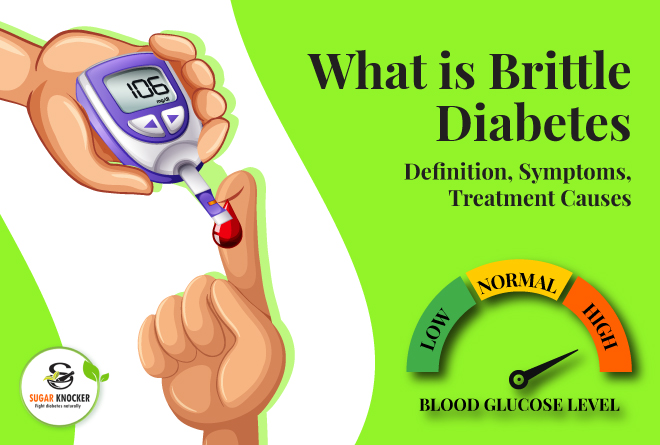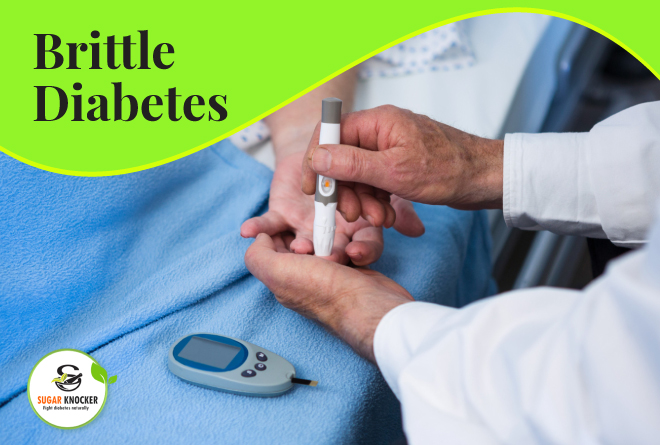
Diabetes is a dangerous disease that affects a substantial percentage of the population. The disorder disrupts the body’s glucose metabolism and control, resulting in an increase in blood sugar levels. As a result, a slew of problems might arise, putting the patient’s life in jeopardy.
Diabetes mellitus affects an estimated 9.4% of the population in the United States. There are several varieties of diabetes, with type 2 diabetes being the most prevalent among them. While type 1 and type 2 diabetes are well-known, it’s vital to remember that there are additional types of diabetes.
What is Brittle Diabetes ?
Brittle diabetes also called unstable diabetes or labile diabetes is characterized by significant and persistent blood sugar changes. This kind of diabetes is uncommon and only affects persons with Type 1 diabetes. Consult your healthcare practitioner about brittle diabetes treatment options, which may include the use of specialized equipment.
Brittle diabetes is a kind of diabetes that is very severe. This disorder, also known as labile diabetes, produces unpredictably high and low blood sugar (glucose) levels. These fluctuations might have a negative impact on your quality of life and perhaps lead to hospitalization.
This syndrome is now uncommon due to advancements in diabetes care. It can, however, happen in persons who have diabetes. It’s a symptom that your blood sugar isn’t being handled properly in some circumstances. The best method to avoid brittle diabetes is to stick to your doctor’s diabetic treatment plan.
Brittle Diabetes

Brittle diabetes is a kind of diabetes that is particularly difficult to maintain and causes significant disruption in daily living. Blood glucose levels in people with brittle diabetes fluctuate dramatically (blood sugar). Hypoglycemia (low blood sugar) or hyperglycemia (high blood sugar) might occur often as a result of the fluctuations (high blood sugar).
Diabetes that is brittle is also known as labile diabetes or unstable diabetes.
What is the distinction between diabetes and diabetes that is unstable?
Many people with diabetes may live healthy lives with medication and lifestyle adjustments. People with brittle diabetes or a brittle diabetic, on the other hand, have a lot of trouble managing the condition, which can lead to:
• Impair their capacity to live a regular life.
• lead to hospitalization or even death as a result of worry and sadness.
What is the prevalence of brittle diabetes?
Brittle diabetes is an uncommon condition. Only around three out of every 1,000 persons with insulin-dependent diabetes are affected.
Who is at risk for brittle diabetes?
People with Type 1 diabetes are more likely to develop brittle diabetes (in Type 1, the body does not produce insulin).
It is more frequent in women in their 20s and 30s for reasons that aren’t entirely understood.
It is a Fact of Life
You can’t foresee when you’ll have a blood glucose fluctuation from low to high. Hospitalization is rather prevalent. It might be difficult to work and keep up with daily responsibilities.
It has the potential to be deadly.
Your doctor will begin treating you by addressing any acute blood sugar needs you may have. You’ll have to keep an eye on your diabetes. New insulin-management technologies and therapeutic alternatives may make it simpler to restore some control.
You might get:
An insulin pump is a little gadget that stays linked to you throughout the day in order to provide you with consistent insulin adjustments.
Pancreatic transplant surgery stimulates insulin production by replacing your pancreas with a dead donor’s pancreas.
Your doctor’s therapy will be determined by the cause of your brittle diabetes. Once you’ve made a strategy, make sure you’re giving yourself the best chance of succeeding:
- Exercise.
- Stick to your dietary recommendations.
- Take your medications on time.
Most importantly, keep in touch with your diabetes team so you can receive both medical and psychological care.
Causes of brittle diabetes

Addressing the issue or factors which may be causing your brittle diabetes may aid your health care team in developing treatment options to address the underlying causes. Your healthcare team can assist you in determining which variables may be contributing to blood sugar levels that are difficult to regulate.
If autonomic neuropathy is the cause, your diabetes experts may be able to provide you with advice on how to properly regulate insulin levels.
If psychological concerns are detected, your health care provider may be able to assist you in dealing with them. Treatments such as talking therapies and mindfulness-based therapies have been shown to be effective in treating stress, anxiety, and depression.
Brittle Diabetes Diagnosis
A brittle diabetes diagnosis might be difficult to make because any diabetes can become unstable if it is not effectively managed. There might be a number of reasons for your blood sugar levels to fluctuate significantly, including not getting your prescription or monitoring your glucose levels as often as you should.
- An eating disorders
- A great deal of stress
- Your intestines have a hard time absorbing nutrition.
- Celiac disease
- Gastroparesis — a disorder in which the evacuation of food from your stomach into your intestines is slowed or stopped
- Insulin sensitivity
It’s usually one or more of these. In many situations, doctors are unsure of the actual etiology.
Symptoms of brittle diabetes

Blood glucose levels in people with brittle diabetes fluctuate suddenly and frequently for no apparent cause. Hypoglycemia or hyperglycemia are the results of the fluctuations.
Hypoglycemia can cause the following symptoms:
- Feeling dizzy, weak, or shaky.
- Rapid heart rate
- Irritability or befuddlement.
- Pale complexion.
- Sleep disturbances.
- Sweating.
- Hunger pangs.
- Blurry vision is a symptom of hyperglycemia.
- Discomfort (feeling weak, tired).
- Urination problems (peeing).
- Headache.
- Cuts that take a long time to heal.
- Appetite or thirst
Diabetic ketoacidosis, a consequence of diabetes, can be caused by uncontrolled hyperglycemia and can cause:
- Dehydration.
- A quick heartbeat.
- Breath with a fruity odor
- Breathing difficulties
- Vomiting.
- Coma.
How is Brittle Diabetes Treated

The most effective strategy to manage this illness is to keep your blood sugar levels in check. The following are some tools that can assist you with this:
An insulin pump that is worn under the skin
For persons with brittle diabetes, the most important aim is to better match the amount of insulin they get to how much they require at any one time. The subcutaneous insulin pump can help with this. It is the most effective treatment for brittle diabetes.
This little pump is kept in your belt or pocket. The needle is linked to a thin plastic tube that is coupled to the pump. The needle is inserted beneath your skin. The device is worn 24 hours a day and distributes insulin into your bloodstream on a continuous basis. It helps to maintain stable insulin levels, which then, in turn, helps to maintain stable glucose levels.
Glucose levels are constantly monitored.
Typical diabetic care is measuring your blood glucose levels on a regular basis, frequently multiple times each and every day. That may not be enough to keep your glucose levels under control if you have brittle diabetes.
A sensor is implanted beneath your skin for continuous glucose monitoring (CGM). This sensor monitors glucose levels in your tissues all of the time and can send you an alert if they get too high or too low. This helps you to tackle your blood sugar problems as soon as possible.
If you believe a CGM system would be beneficial to you, speak with your doctor to learn more.
Other alternatives for therapy
Brittle diabetes is a condition that reacts well to cautious treatment. Despite medication, some patients with the disease continue to have extreme blood sugar changes. These folks may require a pancreas transplant in rare situations.
Insulin is released by your pancreas in reaction to glucose in your bloodstream. Insulin tells your body’s cells to take glucose from your bloodstream so they may utilize it as fuel. Your body won’t be able to metabolize glucose adequately if your pancreas isn’t functioning properly. Pancreas transplants had a high rate of success in controlling brittle diabetes, according to research published in the journal Diabetes Care.
Prevention of Brittle Diabetes

Brittle diabetes is a very uncommon illness that is frequently misdiagnosed. One of the factors brittle diabetes is so difficult to identify is because the issues it produces might be attributed to a variety of other variables.
Eating disorders, stress, celiac disease, as well as other conditions, for example, have been associated with fast blood sugar swings. A physician would typically advise the patient to keep a careful eye on their blood sugar levels. Additional checks may be requested as well. It will also be required to investigate possible reasons. To develop a diagnosis, the professional will review and analyze all of the information gathered.
When it comes to living with brittle diabetes, the most crucial element is to stick to the healthcare team’s regimen. The patient must take their medicine on a daily basis at the correct time. To reduce the likelihood of the patient suffering attacks, any advice given must be followed precisely and carefully.
Glucose monitoring should be done on a daily basis. Some individuals may be recommended to monitor their blood sugar levels several times during the day. Glucose levels will be recorded as part of diabetes care.
Patients may also opt for a continuous glucose monitoring sensor, which is placed underneath the skin. It will also be required to investigate possible reasons. To develop a diagnosis, the professional will review and analyze all of the information gathered. When it comes to living with brittle diabetes, the most crucial element is to stick to the healthcare team’s regimen. The patient must take their medicine on a daily basis at the correct time. To reduce the likelihood of the patient suffering attacks, any advice given must be followed precisely and carefully.
Conclusion
Diabetes, particularly type 1 diabetes, is a lifelong disease that needs ongoing monitoring and control. This might be stressful and daunting, but there are options available to assist you. Because brittle diabetes is connected to mental health, contact a therapist or psychologist who can help you devise a strategy for successfully managing your illness while also addressing any underlying feelings of stress that may be impairing your glucose management.
Brittle diabetes isn’t lethal in and of itself, and in most situations; you and your doctor can successfully treat it. Severe fluctuations in blood sugar, on the other hand, might necessitate hospitalization due to the danger of diabetic coma. This disorder can also lead to additional difficulties over time, such as thyroid disease, adrenal gland issues, depression, and weight gain.
Brittle diabetes prevention is the greatest method to avoid these issues.

